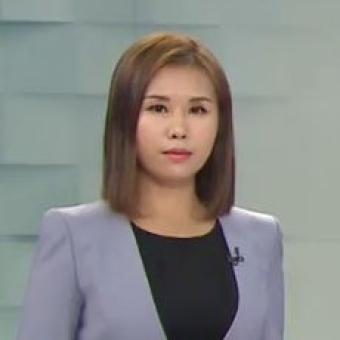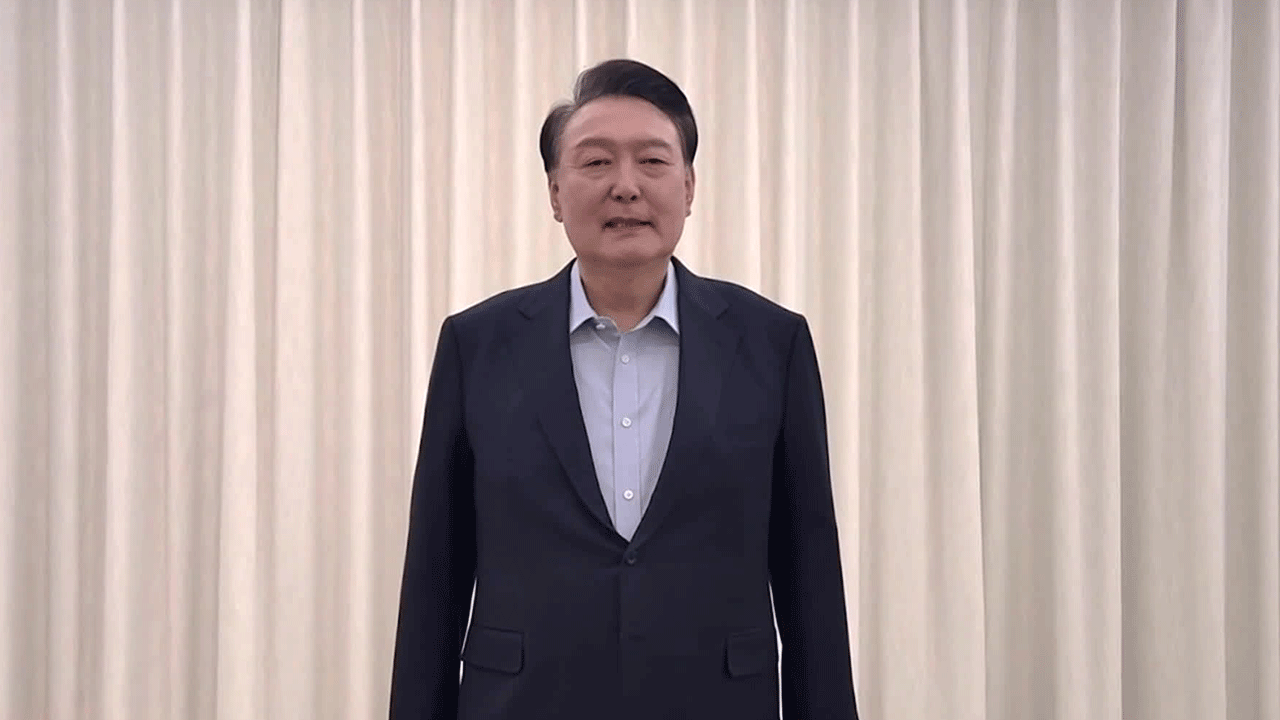Markets rebound despite political uncertainty
입력 2024.12.13 (01:55)
읽어주기 기능은 크롬기반의
브라우저에서만 사용하실 수 있습니다.
[Anchor]
Let’s take a look at the situation in our financial markets.
The stock market was briefly shaken by the president's emergency address, but it successfully continued its upward trend for three consecutive days.
The exchange rate continued its unstable trend but closed lower.
Reporter Hwang Kyung-joo reports.
[Report]
After the crash on Monday, known as Black Monday, our stock market rose for three consecutive days.
Both the KOSPI and KOSDAQ closed up more than 1%.
Although the market seemed to reduce its gains during the day following President Yoon Suk Yeol's emergency address, institutional buying supported the stock market.
Due to the influence of the U.S. stock market, which hit an all-time high, semiconductor stocks rose across the board.
[Park Sang-hyun/iM Securities Director: "Nvidia, Tesla, and the so-called 'Magnificent 7' stocks in the U.S. reaching near all-time highs played a significant role in positively shifting the market sentiment..."]
However, foreign investors continued to sell more than they bought.
The market is paying attention to the fact that even if domestic political instability is resolved, external conditions could still lead to the exit of the Korean stock market and a decline in the value of the won.
[Moon Jeong-hee/Researcher at KB Kookmin Bank: "Even if political instability is resolved, if issues arise with our exports or tariffs due to the start of a second Trump administration next year, that will also affect the won."]
The won-dollar exchange rate closed the week at 1,431.90 won.
It started the day down more than 3 won compared to yesterday (12.11), but turned upward after the president's address, reaching the 1,434 won range at one point in the morning.
In the afternoon, it regained stability but did not drop below 1,430 won.
With ongoing domestic and international uncertainties, including upcoming decisions on interest rates in the U.S. and Japan on Dec. 19, the government stated, "We will respond sufficiently to reverse market sentiment if necessary."
KBS News, Hwang Kyung-joo.
Let’s take a look at the situation in our financial markets.
The stock market was briefly shaken by the president's emergency address, but it successfully continued its upward trend for three consecutive days.
The exchange rate continued its unstable trend but closed lower.
Reporter Hwang Kyung-joo reports.
[Report]
After the crash on Monday, known as Black Monday, our stock market rose for three consecutive days.
Both the KOSPI and KOSDAQ closed up more than 1%.
Although the market seemed to reduce its gains during the day following President Yoon Suk Yeol's emergency address, institutional buying supported the stock market.
Due to the influence of the U.S. stock market, which hit an all-time high, semiconductor stocks rose across the board.
[Park Sang-hyun/iM Securities Director: "Nvidia, Tesla, and the so-called 'Magnificent 7' stocks in the U.S. reaching near all-time highs played a significant role in positively shifting the market sentiment..."]
However, foreign investors continued to sell more than they bought.
The market is paying attention to the fact that even if domestic political instability is resolved, external conditions could still lead to the exit of the Korean stock market and a decline in the value of the won.
[Moon Jeong-hee/Researcher at KB Kookmin Bank: "Even if political instability is resolved, if issues arise with our exports or tariffs due to the start of a second Trump administration next year, that will also affect the won."]
The won-dollar exchange rate closed the week at 1,431.90 won.
It started the day down more than 3 won compared to yesterday (12.11), but turned upward after the president's address, reaching the 1,434 won range at one point in the morning.
In the afternoon, it regained stability but did not drop below 1,430 won.
With ongoing domestic and international uncertainties, including upcoming decisions on interest rates in the U.S. and Japan on Dec. 19, the government stated, "We will respond sufficiently to reverse market sentiment if necessary."
KBS News, Hwang Kyung-joo.
■ 제보하기
▷ 카카오톡 : 'KBS제보' 검색, 채널 추가
▷ 전화 : 02-781-1234, 4444
▷ 이메일 : kbs1234@kbs.co.kr
▷ 유튜브, 네이버, 카카오에서도 KBS뉴스를 구독해주세요!
- Markets rebound despite political uncertainty
-
- 입력 2024-12-13 01:55:44

[Anchor]
Let’s take a look at the situation in our financial markets.
The stock market was briefly shaken by the president's emergency address, but it successfully continued its upward trend for three consecutive days.
The exchange rate continued its unstable trend but closed lower.
Reporter Hwang Kyung-joo reports.
[Report]
After the crash on Monday, known as Black Monday, our stock market rose for three consecutive days.
Both the KOSPI and KOSDAQ closed up more than 1%.
Although the market seemed to reduce its gains during the day following President Yoon Suk Yeol's emergency address, institutional buying supported the stock market.
Due to the influence of the U.S. stock market, which hit an all-time high, semiconductor stocks rose across the board.
[Park Sang-hyun/iM Securities Director: "Nvidia, Tesla, and the so-called 'Magnificent 7' stocks in the U.S. reaching near all-time highs played a significant role in positively shifting the market sentiment..."]
However, foreign investors continued to sell more than they bought.
The market is paying attention to the fact that even if domestic political instability is resolved, external conditions could still lead to the exit of the Korean stock market and a decline in the value of the won.
[Moon Jeong-hee/Researcher at KB Kookmin Bank: "Even if political instability is resolved, if issues arise with our exports or tariffs due to the start of a second Trump administration next year, that will also affect the won."]
The won-dollar exchange rate closed the week at 1,431.90 won.
It started the day down more than 3 won compared to yesterday (12.11), but turned upward after the president's address, reaching the 1,434 won range at one point in the morning.
In the afternoon, it regained stability but did not drop below 1,430 won.
With ongoing domestic and international uncertainties, including upcoming decisions on interest rates in the U.S. and Japan on Dec. 19, the government stated, "We will respond sufficiently to reverse market sentiment if necessary."
KBS News, Hwang Kyung-joo.
Let’s take a look at the situation in our financial markets.
The stock market was briefly shaken by the president's emergency address, but it successfully continued its upward trend for three consecutive days.
The exchange rate continued its unstable trend but closed lower.
Reporter Hwang Kyung-joo reports.
[Report]
After the crash on Monday, known as Black Monday, our stock market rose for three consecutive days.
Both the KOSPI and KOSDAQ closed up more than 1%.
Although the market seemed to reduce its gains during the day following President Yoon Suk Yeol's emergency address, institutional buying supported the stock market.
Due to the influence of the U.S. stock market, which hit an all-time high, semiconductor stocks rose across the board.
[Park Sang-hyun/iM Securities Director: "Nvidia, Tesla, and the so-called 'Magnificent 7' stocks in the U.S. reaching near all-time highs played a significant role in positively shifting the market sentiment..."]
However, foreign investors continued to sell more than they bought.
The market is paying attention to the fact that even if domestic political instability is resolved, external conditions could still lead to the exit of the Korean stock market and a decline in the value of the won.
[Moon Jeong-hee/Researcher at KB Kookmin Bank: "Even if political instability is resolved, if issues arise with our exports or tariffs due to the start of a second Trump administration next year, that will also affect the won."]
The won-dollar exchange rate closed the week at 1,431.90 won.
It started the day down more than 3 won compared to yesterday (12.11), but turned upward after the president's address, reaching the 1,434 won range at one point in the morning.
In the afternoon, it regained stability but did not drop below 1,430 won.
With ongoing domestic and international uncertainties, including upcoming decisions on interest rates in the U.S. and Japan on Dec. 19, the government stated, "We will respond sufficiently to reverse market sentiment if necessary."
KBS News, Hwang Kyung-joo.
-
-

황경주 기자 race@kbs.co.kr
황경주 기자의 기사 모음
-
이 기사가 좋으셨다면
-
좋아요
0
-
응원해요
0
-
후속 원해요
0















이 기사에 대한 의견을 남겨주세요.